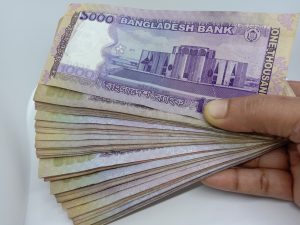In late September 2022, Bangladesh’s foreign reserves dwindled, compelling former Prime Minister Sheikh Hasina to seek budget support of around $4.7 billion.
Around the same time, the U.K. daily, The Financial Times, was drafting a story featuring a Bangladeshi watch collector, Ahmed Rahman. Ahmed Rahman is the nephew of Salman F. Rahman who used to be a powerful adviser of Sheikh Hasina. Salman is now in custody.
The story published in The Financial Times pointed out that apart from expensive watches, Ahmed’s family owns numerous properties in the U.K. worth millions of U.S. dollars. Another news site, Netra News, published previously that Sheikh Hasina’s sister Sheikh Rehana lives in one of the houses owned by the Rahman family in the U.K.
How Ahmed and his family transferred this large amount of money to the U.K. remains a puzzle as Bangladeshi law restricts the amount of money sent abroad.
However, it’s public knowledge that the ruling elites under Hasina’s Awami League-led regime in Bangladesh used many dark methods to siphon money abroad. According to Al Jazeera’s investigative desk, for example, Saifuzzaman Chowdhury, a former land minister in the Hasina government, whose global wealth portfolio is over $500 million, siphoned most of his money out of Bangladesh.
With Hasina’s resignation and the exit of the AL government, a new interim government under Mohammad Yunus has taken charge. This government needs to bring back Bangladesh’s stolen assets.
The Yunus government has already taken some bold steps to revive the economy. It is, for example, implementing financial sector reforms by reshuffling boards of controversial banks, and seeking debt support from the IMF, World Bank and Asian Development Bank. Despite these efforts, Bangladesh’s exchequer remains strained.
Hence, in addition to seeking loans, the interim government must explore avenues to repatriate the laundered money, which will not only boost the economy but also help reduce the debt burden.
There are four ways that Bangladesh can recover its stolen assets.
Firstly, Bangladesh is part of the Stolen Asset Recovery Initiative (StAR), a partnership between the World Bank Group and the United Nations Office on Drugs and Crime (UNODC), but is yet to utilize its full potential as the Hasina regime used it as a tool to harass opposition leaders instead of using it to recover the assets. Under this initiative, the U.K. government helped Bangladesh to get back around $1.5 million.
Secondly, the interim government can work with other governments to impose targeted sanctions against suspected money launderers and freeze their assets, forcing them to return to Bangladesh and surrender.
Thirdly, the U.S. Foreign Corrupt Practices Act (FCPA) can be a game-changer if the laundered money is invested in or transacted through the U.S. financial systems. Bangladesh can learn from the FIFA corruption scandals and use the knowledge to target Bangladeshis accused of corruption and now living in the U.S. One notable example is Manmath Ranjan Baroi, an aide to former Minister for Education Nurul Islam Nahid, who was accused of corruption and fled to the U.S. in April 2020. Another is the ex-land minister Saifuzzaman, who is said to have invested in the U.S., according to Bloomberg.
Finally, Bangladesh’s Anti-Corruption Commission (ACC) must work with the governments of countries considered the destination of money laundering by Hasina’s cronies and enhance financial intelligence sharing about the suspected individuals. Government-to-government partnerships should be initiated regarding legal assistance to prevent money laundering and to repatriate funds, particularly with the U.S., U.K., Canada, UAE and Singapore, known to be popular destinations for money launderers, as an immediate step.
While Bangladesh needs to step up and act fast to explore the options and build global partnerships, the governments in the West, Middle East, and Southeast Asia should also cooperate and show goodwill in helping Bangladesh to recover the laundered money.

































